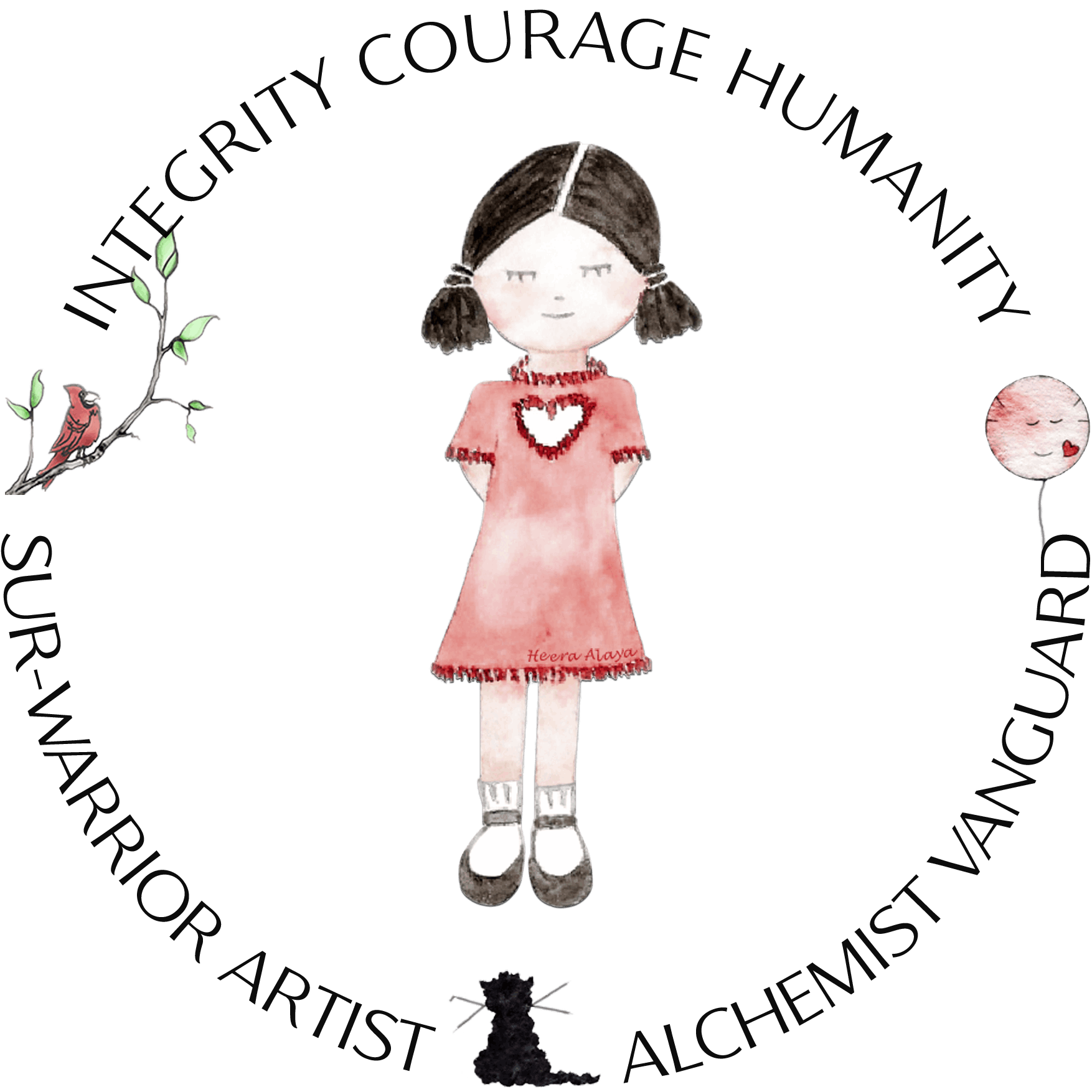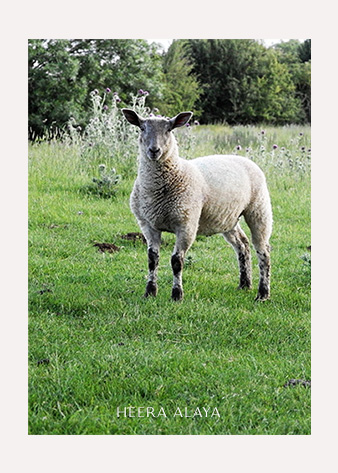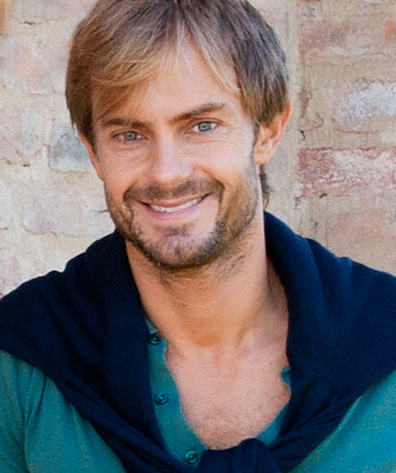
“When you know yourself,
you learn to respect nature, eat healthily,
and live well instead of buying things
and gossip papers.”
GUIDO MARTINETTI
Organic farmer and entrepreneur, IT
January 1st, 2021
OPEN WINDOWS | In Conversation
Friends and business partners Guido Martinetti and Federico Grom have engineered their reputations on an uncompromising commitment to excellence. Grom, their gelato business, wears this signature. At the forefront of my conversation with Guido Martinetti, at his farm, Mura Mura, Costigliole d’Asti, Italy, stands quality—in nature, farming and relationships.
Heera Alaya: Guido, thank you for having me on your beautiful farm. Tell me, why gelatos? And where did it all begin?
Guido Martinetti: Yes, it’s very, very easy. I love sweets, but I am also a little different; I like to run and swim, and they are philosophical kind of efforts because I love to stay alone, and it’s like yoga—
Meditative?
Exactly, exactly. I always say running, and swimming is like yoga—you analyse yourself and life. So I don’t need a sweet dish when I run and swim. But if I don’t run or swim, I need sweets. When I was younger, my favourite sweet was ice cream.
While in school, I read an article in the Turin newspaper La Stampa that said, except for a shop in Orvieto [Umbria], no one made gelato the natural way, without preservatives, added colours, or any aroma. So I went to Orvieto with my girlfriend, and we tasted the gelato. I remember this gelato clearly. My girlfriend took the melon flavour, and I said, “No, how can you choose melon flavour?” I love chocolate and pistachio. Well, I took two flavours, and she took two. And I tasted her gelato; it was real melon! And I said, “The article is true!” So this hit me. But I didn’t think of it as work.
The gelato left a positive impact.
Exactly, exactly. And though Federico was a friend of mine since high school, we only got to know each other well when we served in the Army.
It’s interesting how certain people weave in and out of our lives at the right time.
A lot. I talk about luck a lot. And I reflect on this a lot, exactly like you say. I was in the wine business, and later, when Federico was working as a financial manager for a company, I took some wine for him, for his company. And we talked about doing things like two regular guys, 26 and 27 years old. That’s when I told him about the article in La Stampa and that maybe we could make the best gelato with the best ingredients in the world; it was a quick dialogue. After ten days, Federico called me back and said: “Guido, we must meet.” By then, I had forgotten all about the gelato.
I said: “Federico, what’s happening?” Federico came with 60 pages of study about the world of gelato and said: “This is what I studied in these ten days,” and he showed me a business plan to make gelato. Remember that the gelato business was approachable because it was a very small shop, just 30 meters. We needed little money to start; it would have been impossible for us if the business required a big investment.
You can imagine our personalities—Federico is consistently focused, and I am more about ideas and originality. If I hadn’t met Federico, my idea would have remained an idea. I am conscious that Federico took that idea and made my idea a reality.
I admire your graciousness. I am sure Federico feels the same about you. It also pushes you to be your best at all times, right?
Exactly. And now, when I talk more and more about luck, it’s true. When you are 35, like Federico and me, and when you build a company with more than 500 employees, you feel a lot of responsibility for many people, so I wake up early in the morning and look for excellence. If I can look for excellence, many people enjoy it differently.
We must dream every day.
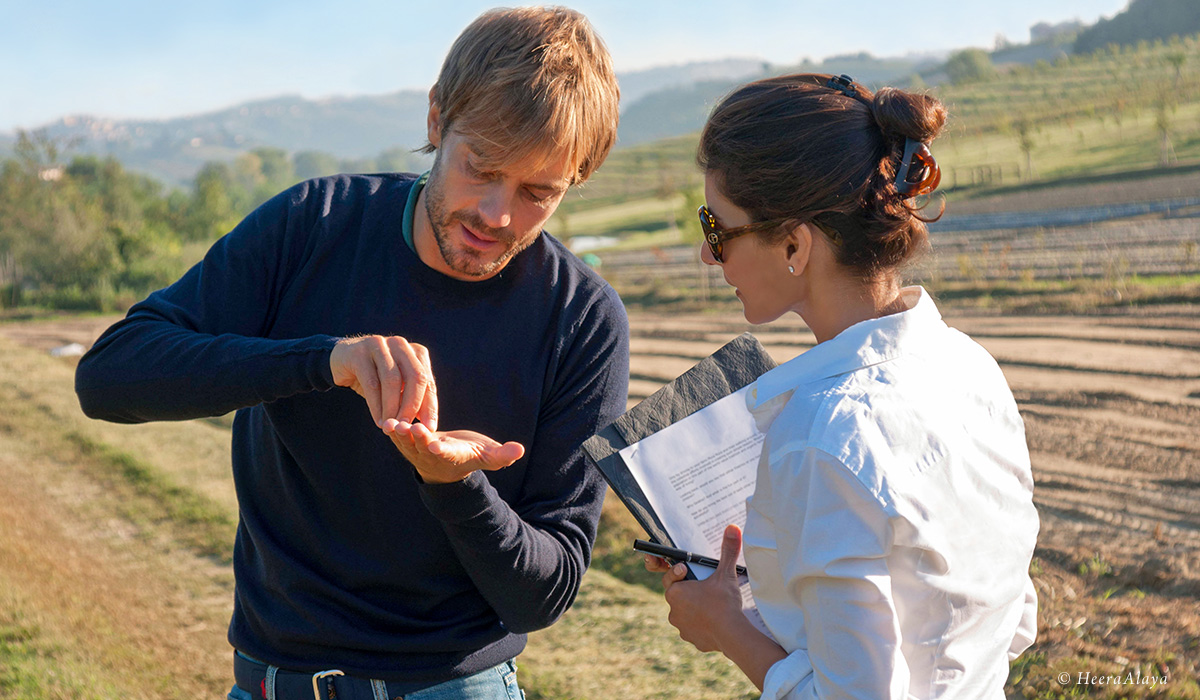
Is Grom gelato made with organic milk?
No, not at the moment [referring to organic milk]. In Italy, finding organic milk at the moment is very hard. One of the projects that Federico and I have is to have our cows, also for the manure. We need forty hectares; at the same time, it’s a five-million-euro investment. At the moment, we cannot afford it. I hope to have the funds in four to five years. To have our cows will be a dream that becomes a reality.
And what about eggs?
Only organic.
Is organic farming appreciated in this part of the world [Piedmont, Italy], or has it changed with the times?
It’s incredible; the culture for food was much higher. Ninety percent of Europeans don’t know that a cow must have a little cow before making milk. It’s surprising, yeah?
You have more food culture when you touch the land and the farm with your hands and sell to the local markets.
You weren’t obliged to harvest fruit and ripen it to sell from where you lived. When you trade in the local markets, you take it in the morning and sell it by the afternoon, so people are in the habit of eating fresher food full of flavour.
In India, there was a time when one could buy fresh fruit from a vendor who went door to door with his basket or sold fresh produce from a cart. Increasingly, polished symmetrical fruit packaged in layers of plastic is preferred. Flavour isn’t a priority.
Exactly. When you want to sell fresh fruit to the market, the first thing you look for is the aspect, the perfect shape and colour. For example, red peaches are more attractive than peaches that are part yellow and part red. The people behind the farmers make various selections and don’t look for flavour, aromatic, and tasting quality. They look for an appealing red colour. The market is also changing because I imagine a nation grows by eight to ten percent [a year], but you must find your road after a while.
It will be difficult for food production in countries such as India and China to sustain population growth.
Yes, absolutely. If the populations you are talking about can pay, they will adopt the beef culture like Americans, which we cannot sustain. The approach to beef and the way cows are raised are significant problems and dangerous for the planet. Do you eat meat?
I don’t eat meat, but I understand what you are saying.
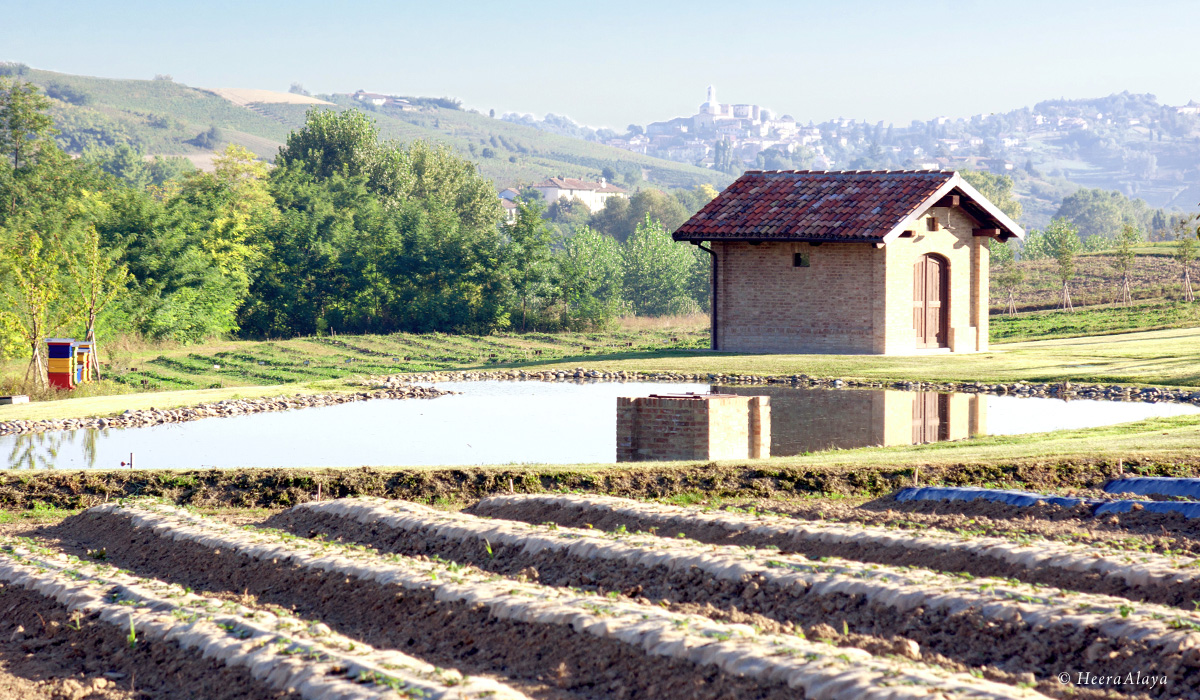
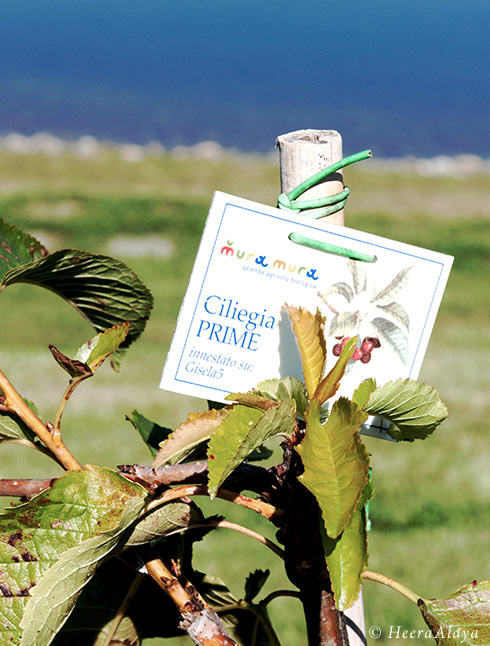
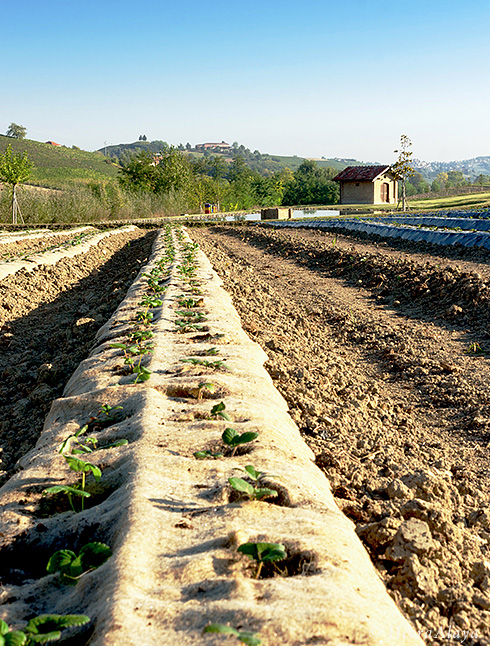
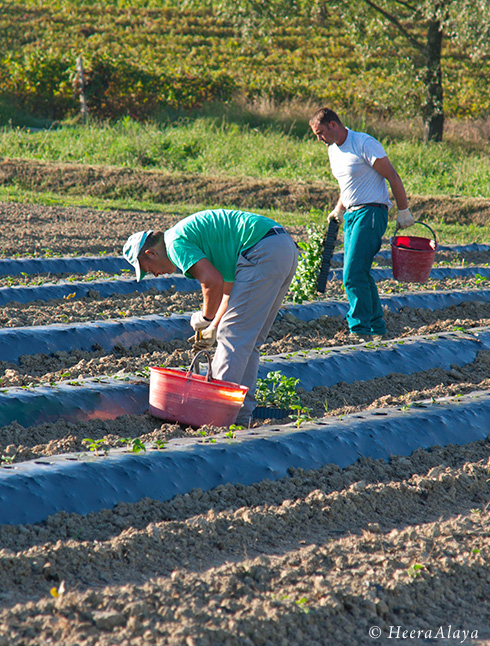
Compared to most gelatos that taste sweeter and synthetic, Grom gelatos taste delicate. Have we lost sensitivity to appreciating natural flavours, or would you attribute it to other factors?
What you are saying is perfectly true—natural flavours are about aromas. You don’t lose sensitivity; you lose the habit. First, there is massive production—if you have a farm and produce one hundred, you gain from one hundred; if you produce four hundred, you gain from four hundred. Second, people want to conserve gelatos for a long time, which means aggressive treatments before packaging, and packaging means loss of aromas. You put the two things together: low quality and low aroma, plus conserve for a long time. You don’t have aromas in the product, and thus, you must add them artificially.
At the same time, the chemical world becomes stronger every day for the researcher; they can create aromas. If you look for food in a supermarket, if it’s packaged, you find aroma. So, to make the gelatos, I look for natural aromas and acidity. You have a fresh sorbet in your mouth if you have good acidity.
Did you start cultivating fruit to produce flavourful fruit for your gelatos?
It’s one of the reasons why we decided to grow fruit ourselves.
Nothing compares to naturally grown fruit that ripens over a suitable period.
Yes, at the same time, farming is tough because the farmers cannot meet the selling window. The farmers sell it to somebody, who sells it to another one, who sells it to the market.
You benefit from good weather, but you also have to endure spells of bad weather. How do you deal with nature?
For example, what would we do if it were to rain today during my interview with Heera? We would take an umbrella, and we would go on. Likewise, if agriculture decides that grapes are not very good this year, you must accept it, which is a lesson. Keep in mind that only some of the fruit we use for our sorbet comes from Mura Mura, as the trees aren’t big enough to give us this quantity; we use only strawberries and mangoes. For example, our strawberry sorbet offered in April, May and June has Mura Mura strawberries only during June because we don’t have ripe enough strawberries in May. And lemons, for example, here [Mura Mura], the winter is too cold for lemons and mandarins, and as we use a lot, especially lemons, I must buy them from a supplier close to Naples.
So you aren’t dependent on one source, which helps you balance production when the weather doesn’t go according to plan.
Yes. It’s very important.
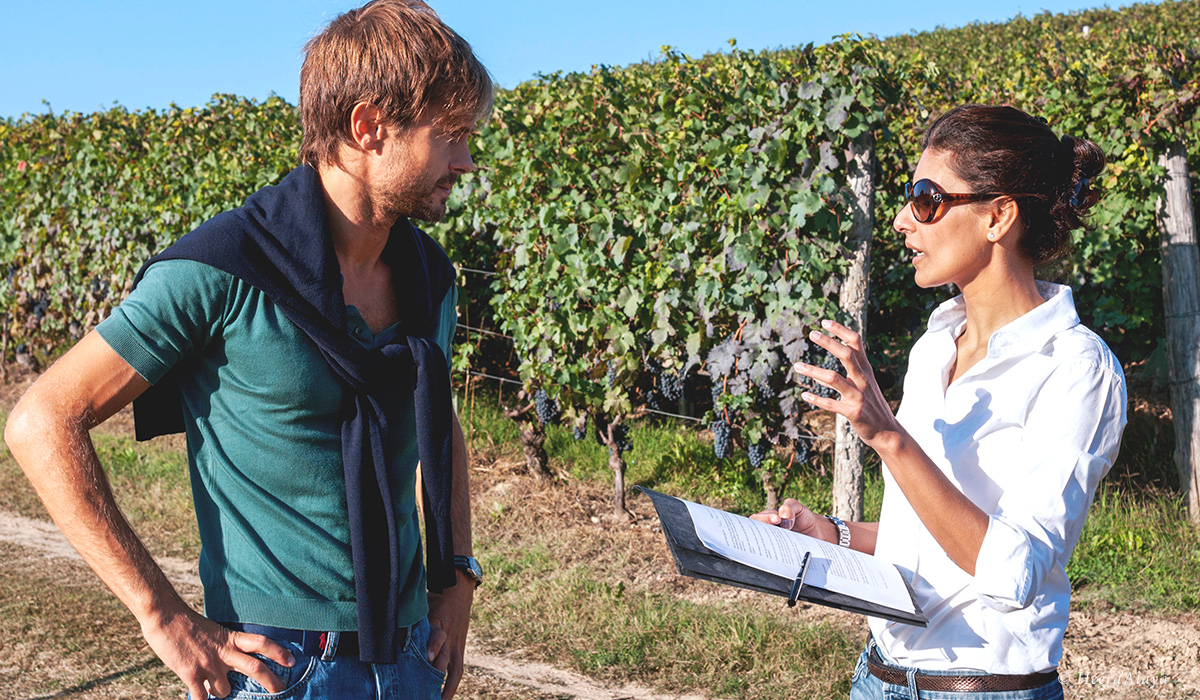
The farms, which I noticed on my way to Mura Mura, appear rather small.
Exactly; the medium property in Piedmont is very small. The farms can be as small as half a hectare.
Was it an uphill task to acquire your farm?
We got lucky. When we were looking, we found this guy who put together nine different farmers to sell us the land.
Your farm appears to be in layers and sections.
Exactly. We are buying more land every year to permit our shops to grow in number. To increase in number, we must produce the fruit we decide to use. We are planting thousands of trees, but we will leave the trees over there [a section of the farm], and the ground will be a flowering ground for the bees. I am very proud of what we have created. I have gained the respect of people around here because they have not seen this kind of approach for generations now.
Is it beneficial to sow a variety of plants?
Absolutely, absolutely. In agriculture, monoculture, a single culture is bad.
Do you practice crop rotation?
Yes. Like the melon, in 2011, the melons will be here [pointing to sections of the farm], and in 2012, they will be there. In 2013, they will be here, and the strawberry will be there.
How does crop rotation benefit the soil?
We let the soil rest for a year. During this period, we cultivate beans; we don’t cultivate to sell. When beans are ripe, they are full of organic matter, so we leave them in the soil.
The organic matter naturally enriches the soil.
Guido, I am distracted by these beautiful dragonflies.
I want to have as many [insects] as possible. I also have a lot of Coccinella—the red insect with the black dots.
The ladybug.
Ladybug, exactly. I have a lot because it’s natural, and when I have flowers over there [pointing to different parts of the farm], the trees over there, I will have more and more
Species together?
Exactly. And there will be a new balance at Mura Mura.
Explain this balance. Why is it essential for us to share the planet?
I cannot explain why it’s so important, but I can easily analyse what happens when we don’t respect the planet. We eat the planet by ourselves, not thinking about the next generation.
I don’t know that insect’s name, but that is a jumping one.
It’s a grasshopper.
Exactly. Heera, you know all these insects; it’s good. Also, frogs stay well in this pond.
I always make this example of my parent’s generation smoking more cigarettes. Most of them would toss the cigarettes on the ground. And then there will be a time when somebody must take the cigarettes out from the field.
If we want future generations to live well and not pick up cigarettes, we must not throw things mindlessly.
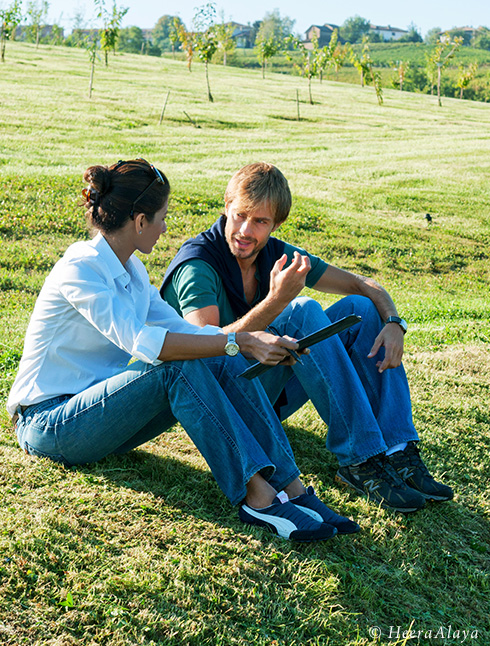
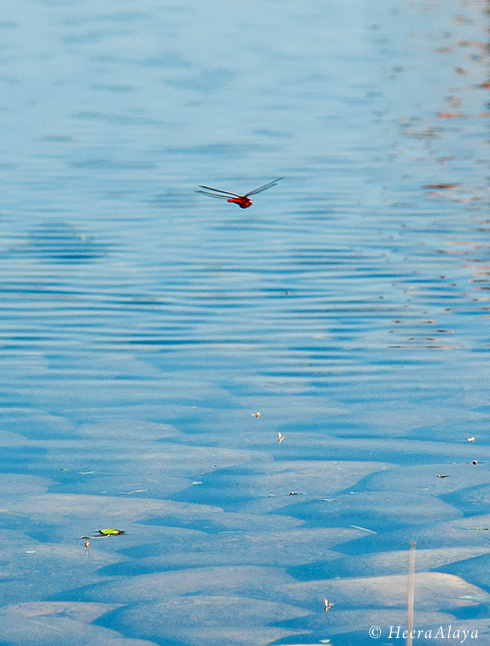
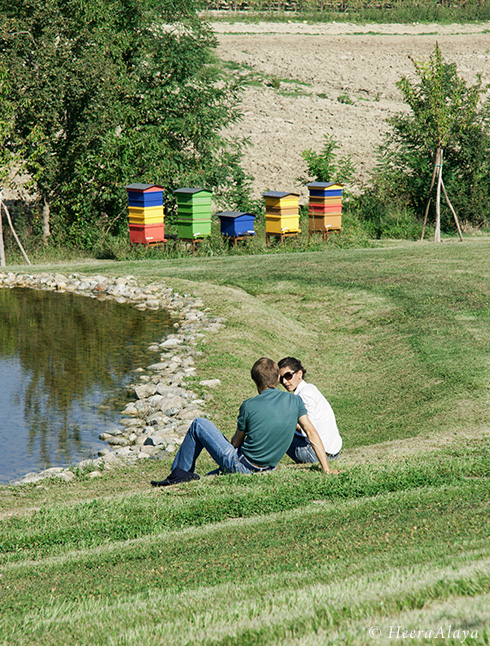
So, we must reflect on what we have inherited and be mindful of what we contribute to the next generation.
Yes. There is a beautiful project—Grom loves the world. This project has some famous phrases from the past about nature and sustainability, and a beautiful phrase says: “The land is not something we had by our parents, but it’s something we had by our sons,” which is a different approach.
I have never seen strawberry plants cultivated in this manner—with a fine mesh covering the plant and soil.
You will not see it [fine mesh] anywhere. I am very proud of Mater-bi cultivation; it’s completely natural and thus very expensive. We use this mesh for two reasons—first, to protect the strawberry plant from bad grass, and second, the strawberry has a very short part of the plant that goes into the soil; its [roots] are not deep like a fruit tree. [Pointing to tiny irrigation tubes] This is for water that goes drop by drop for the plant; it helps keep humidity in check.
It’s biodegradable.
Exactly. Mater-bi has very few microns; 18 microns. One micron is one one-thousandth of a millimetre, so one millimetre is shared in 1,000 parts, and this is 18 microns. We are using this covering to experiment with a company that produces Mater-bi, the same material we use to make spoons.
It’s impressive how you have incorporated Mater-bi into other products, like spoons. Think of the thousands and millions of little spoons that contribute to the growing mountains of plastic, and then one can appreciate the smallest changes that help our environment. Are your gelato cups made from Mater-bi as well?
Our cups are paper with a Mater-bi lining to prevent the paper from becoming soft due to moisture; it’s about 10 percent of the cup’s weight.
What led Federico and you to address the environment and invest in biodegradable products like Mater-bi and FSC [Forest Stewardship Council] recycled paper?
Luck. Federico and I are fortunate because we started with empty pockets when we were 27; we had a simple idea of making gelato with top-quality ingredients. And we are lucky because of our meeting—we have the same kind of education, but different talents. And to be honest, the concept of social sustainability comes later. The first thing we work on is the quality of life of the people who work for us. And you know, the culture of black money is high in Italy.
This situation [of black money] is also true in India.
It’s the same?
Yes, corruption is prolific. Thousands of farmers commit suicide every year; their lives are not valued. On the one hand, we want to indulge ourselves with things, and on the other hand, we convince ourselves that young children lighting their father’s funeral pyres is acceptable. The focus is on amassing money. I cannot comprehend how the human mind rationalises greed.
In Italy, corruption is a big, big problem. We think one-third of the country’s accounts are black money, which is a problem. I pay a lot of taxes for my employees. In 2009, we paid 60 percent. A company’s tax depends on IRES [tax on gain] and IRAP [tax on people’s work], and the percentage differs from company to company, especially for IRAP. Tax is very high.
The first thing Federico and I decided was to be honest with everything. After that, when you are young, you think you are lucky. There is a lot of will, a lot of determination, a lot of patience, and a lot of other things. And we have this kind of education where we were taught the importance of giving back—to work well and give back some of our luck. So, the green approach is the last step.
For many companies, the concept of sustainability has a lot of marketing aspects. With social responsibility, you have two options—you do it silently because you do it for yourself, or you tell the world because you do it for publicity.
With growing awareness, do you foresee organic food becoming affordable?
Organic farming will be the only way forward. We must not ruin the planet by doing it a disservice. In the 1990s, Europe reached the lowest point of agricultural quality.
Unfortunately, we think buying things—cars, bags, shoes and everything—makes us happy. I hope in future generations, more and more people will understand that our happiness doesn’t depend on what we buy.
For example, in what is described as low culture, people spend a lot on cell phones, cars, and clothes but not on eating properly. My long-term vision is to change people’s culture to have a different approach to money and happiness.
Thank you for mentioning culture. People spend significant amounts of money on tabloid-style magazines but not healthy food, stripping themselves of emotional nourishment. Media and marketing inform people daily that it’s okay to spend on cosmetics, clothes and cell phones; spend on anything, even supplements, but not on well-being.
Exactly. Why do you think low-culture people buy gossip magazines? Because they are not curious about themselves, they want to see how others live. It’s a question of their culture. But I am very optimistic that the human race will be able to become wiser in time.
So, we need to step back and reflect. I see the pond with a wide lens because we are away from it. Had we been closer, my view would have been narrow.
Exactly. It’s the same with agriculture and farming; we are arrogant to forget the experiences of our grandmothers and grandfathers. We should also remember that we will be fathers and mothers and grandmothers and grandfathers; we must be able to educate our sons and daughters.
The deep teaching is not to say, “Do this, do that, or I did this, I did that, no.” It’s to allow people to discover what you suggest; they should not perceive what you have suggested.
It’s a gift.
Exactly. It’s very difficult, but it’s the way of wise people. My mother said, do what you want, but I will not give you money, and always tell me the truth. I was never attracted to drugs because, to me, it was not something forbidden. Instead, it was a question of how I wanted to manage my life and body, like you; it’s a different approach to life. But when I was 13 or 14, I couldn’t understand the depth of things my mother taught; now I do.
I read an article in the newspaper about a boxer who was separated from his wife. After being released from jail—he was in jail over a fight—he went to his wife’s house to give his daughter 200 euros for losing her tooth. Giving money was quick and easy for this boxer—and she was a happy daughter—but it’s a way to make a child unhappy.
Emotional involvement requires thinking and investment. Adults who are not thoughtful in giving teach children to equate self-worth and confidence with material things. The glue in families lacking emotional connection is only external.
Exactly. I understand perfectly. Material things will never make a child happy. And these children who keep taking will think they need different things to be happy, which is not deep happiness; it’s five minutes of happiness. I am not happy if I buy a new watch, a different car, or everything else. I am much happier and more emotional if I harvest my first peach this year.
If people were happy with objects, every rich person would be happy, but it’s not that way. Why?
And with the approach to agriculture, you must believe a lot in the project; you don’t know what will happen. You don’t put a cherry tree here and see what happens after two days. No, you know what happens after four years of working and believing in something. It’s also a lesson, no? You can manage more things in many other fields, especially the industrial approach. In agriculture, it’s a meeting between agriculture and man, so it’s a lesson.
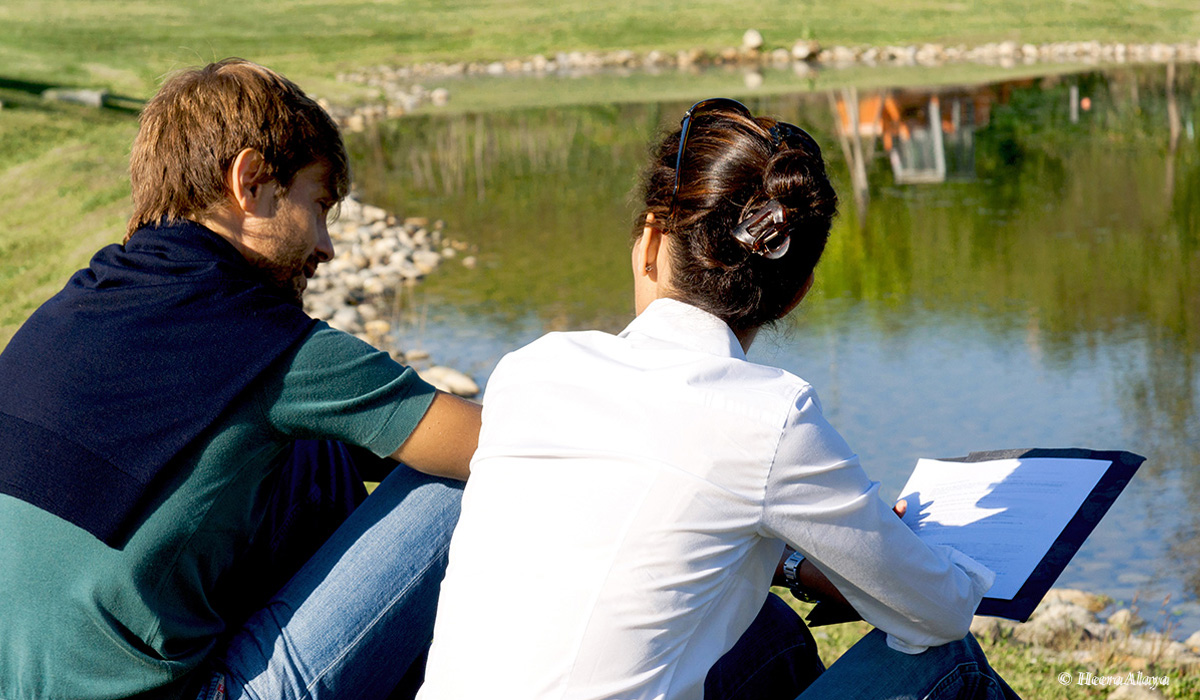
Do you have any plans to sell Grom?
I am not sure. If I sell Grom, it’s because I want to be a father in the future. Today, I work 14 hours a day. In the future, I want to be a father for 14 hours a day.
How do you maintain Grom’s core values with expansion?
About growth, it’s straightforward. There are two factors—first, the goal we want to reach is to make the best gelato in the world; second, the company is not publicly held.
And you can control expansion with direct ownership?
Absolutely. I don’t need to answer anybody. If my company is on the market or has other partners, I have to answer them. If my partners see things my way, it’s easy. Right now, we are two, and we are few. If you are in the market, they expect you to gain more and more and more. So, you must make decisions in a short-term period; our decisions are long-term.
What makes you spiritual, reflective and philosophical?
It’s a question of my character: looking for information and analysing things. I am very curious—not the gossip curious, not interested. For example, if I have to put the grass here, I ask which grass, how, why, and what will happen in five years. I have a few friends and hope to have a wife and family someday. So, right now, I have time to analyse. Many people are scared to be alone, but I am not. I love to read, and I also love to have information—it can be a new language, or it can be visiting Colorado or seeing a beautiful valley or somewhere else. I want to travel the world.
One day, I will be 80, and when I look behind, I want to be satisfied. I want to be proud of myself. I want to say: “I lived a good life.” If not, I will not die happy, and that is a problem. Socrates says one simple but important thing: “Know yourself.” When you know yourself, it’s easier—you go around the world and are one piece of a chain, and you learn to respect nature, eat healthily, and live well instead of buying things and gossip papers.
Learn more about Guido Martinetti.
